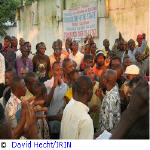 KINSHASA, 12 Jun 2006 (IRIN) - Thousands of Congolese on Monday took to the streets of the capital, Kinshasa, to demand negotiations that would see the main opposition party included in the country's electoral process. The demonstration came a day after a United Nations Security Council delegation arrived for a visit.
KINSHASA, 12 Jun 2006 (IRIN) - Thousands of Congolese on Monday took to the streets of the capital, Kinshasa, to demand negotiations that would see the main opposition party included in the country's electoral process. The demonstration came a day after a United Nations Security Council delegation arrived for a visit.
At one point, police shot into the air to disperse the protestors when they became violent, stoning vehicles and buildings. Most of the demonstrators were supporters of the Union pour la democratie et le progres social (UDPS), which is led by veteran politician Etienne Tshisekedi and is boycotting the 30 July elections.
The demonstration was held as members of the UN Security Council, led by the French ambassador, Jean-Marc De La Sabliere, held talks in Kinshasa with government officials and diplomats who are members of the Comite international d'accompagnment de la transition (CIAT), as well as with representatives of UN agencies, the World Bank and NGOs. The UN team is scheduled to end its visit on Monday.
"We want to remind the Security Council of its promise made on 5 November [2005] do everything to ensure truly inclusive elections in this country," said Joseph Mambanga, one of the demonstrators and a supporter of Tshisekedi.
Following the signing of a peace agreement to end civil war in the Democratic Republic of Congo in December 2002, a transitional government was formed. The transitional period, which was to have ended on 30 June, was extended by the electoral commission by one month to facilitate the holding of general elections, a move the UPDS has opposed.
A UDPS spokesman, Denise Lupeto, said the extension of the transitional period beyond the 30 June deadline was illegal. He added that preliminary negotiations between the government and the UDPS should have been held to ensure the party's inclusion in the Independent Electoral Commission as well as in a media regulation commission.
In December 2005, during a referendum on the country's constitution, Tshisekedi urged UDPS supporters to boycott the vote. However, in early 2006, he announced that he was ready to take part in the electoral process but only on condition that voter registration would be extended to enable his supporters to enrol, and for his party to be included in the electoral commission and the media regulatory body. However, the electoral commission went ahead with its calendar without taking the UDPS' demands into consideration, prompting Tshisekedi to announce once more that the UDPs would boycott the parliamentary and presidential elections.
A total 33 candidates are contesting the office of president, while at least 9,000 parliamentary candidates are vying for seats in the 500-member parliament.
Related articles
- • Tshisekedi Announces Government of National Unity and Calls for Unity Against M23 Rebels (February 23, 2025)
- • Felix Tshisekedi Sworn In as DR Congo President (January 24, 2019)
- • Felix Tshisekedi withdraws support for joint opposition presidential bid (November 12, 2018)
- • Jean-Pierre Bemba Returns to DR Congo (August 1, 2018)
- • At least 30 dead after massacres in Ituri (March 2, 2018)
- • Botswana Urges Joseph Kabila to Step Down (February 26, 2018)
- • No elections in DR Congo in December without electronic voting machines: INEC (February 13, 2018)
- • Felix Tshisekedi accuses INEC of illegally prolonging Kabila's mandate (October 24, 2017)
- • DR Congo reach final of African Nations Championship (February 3, 2016)
- • Political tensions 'running high' in DR Congo ahead of 2016 elections (October 7, 2015)
- • Police Open Fire on Crowd Protesting Election Law Change (January 19, 2015)
- • Etienne Tshisekedi Evacuated to Belgium for Medical Treatment (August 16, 2014)
- • 15 dead in football match stampede in Kinshasa (May 12, 2014)
- • Security Council extends UN mission, intervention force in DR Congo for one year (March 28, 2014)
- • Death toll in Lake Albert boat accident rises to 108 people (March 24, 2014)
- • M23 Rebels Kill, Rape Civilians in Eastern Congo: Human Rights Watch (July 22, 2013)
- • UN Security Council Condemns Latest M23 Attacks, Extends Sanctions on Rebels (November 28, 2012)
- • The M23 Rebels Want to Overthrow Kabila? Nonsense (November 28, 2012)
- • Thousands of Women March Against M23 Rebels in Kinshasa (November 24, 2012)
- • Protests Against M23 Rebels, Government and UN Spread (November 22, 2012)
- • Thousands Protest M23 Capture of Goma, Turn on Government and UN (November 21, 2012)
- • Police Investigate Former Prime Minister for Corruption (May 14, 2012)
- • TP Mazembe Reach Sixth Consecutive Champions League Group Stage (May 13, 2012)
- • Kony 2012 video director detained (March 16, 2012)
- • Opposition Supporters Step Up Attacks on Congolese Officials Abroad (February 28, 2012)
- • Tshisekedi Leaves 'House Arrest' to Meet German Ambassador (February 27, 2012)
- • Kabila Is Open to Dialogue with Tshisekedi, Government Spokesman Says (February 22, 2012)
- • Kabila's Senior Advisor Katumba Mwanke Dies in Plane Crash (February 12, 2012)
- • Cardinal Monsengwo to Lead Annual Spiritual Exercises in the Vatican (February 11, 2012)
- • Kabila's Party Loses Seats in Parliament, Increasing Reliance on Allies (February 3, 2012)







